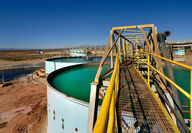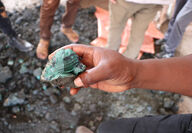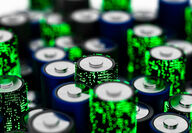Sorted by date Results 1 - 24 of 24

Landmark deal ties US aid to Ukraine's critical mineral wealth. A national race to restore domestic critical mineral supply chains and break dependence on Chinese-controlled resources has defined the industrial and geopolitical landscape. Yet, one of the most unexpected and consequential developments came in 2025, when the United States and Ukraine finalized an agreement linking future assistance to mineral development, creating economic interests that strengthened security... Full story

The US and its allies respond as China asserts its dominance. Welcome to Critical Minerals Alliances 2025, the fifth installment of the annual Data Mine North special publication dedicated to delivering in-depth insights into the rapidly evolving and hotly contested global arena of critical minerals. In past editions, we have explored the materials science innovations, geological realities, economic concerns, and geopolitical strategies reshaping the critical minerals... Full story

US and its allies harden critical mineral policy into action. Long recognized as a critical input for defense systems and industrial tooling, tungsten is serving as a practical example of how the United States has begun to turn strategy into action – applying tariffs, procurement restrictions, and allied coordination to address its complete dependence on foreign supply. Shaped by sweeping executive directives and targeted trade measures, the U.S.'s approach to mineral security... Full story

Rio Tinto steps up to meet America's growing tellurium needs. Extremely rare, extraordinary, and critical to the energy transition, tellurium is one of the early success stories in the United States' effort to decouple its critical mineral supply chains from China. As one of the scarcest of the solid elements on the periodic table, tellurium is a name that has traditionally not been part of the American lexicon outside of geology and chemistry classes. Much like many of the... Full story

Developing bigger and better for long-term energy storage. Rising battery demand and geopolitical tensions have elevated vanadium from a niche material valued for its strength-enhancing role in steel production to a key player in the clean energy transition – powering durable, scalable, and non-flammable redox flow batteries built to store renewable energy at grid scale. Now, the U.S. is making a push to reduce reliance on China, Russia, and South Africa – nations that dom... Full story

Emerging partnerships signal a new era of aligned global supply. As the United States moves to loosen China's grip on critical mineral supply chains, nations across Africa, the Arctic, the Americas, and the Indo-Pacific are emerging as potential partners in a broader strategy to secure resources and strengthen domestic production. While not all deals are finalized, diplomatic outreach, technical dialogues, and preliminary investment proposals signal Washington's intent to... Full story

Touchscreens, 5G networks, and quantum computing drive demand. Embedded deep in the circuitry of modern life, indium is the invisible ingredient behind today's most visible technologies. Whether swiping a smartphone or transmitting quantum data, this little-known metal plays a central role in the digital, defense, and clean tech revolutions. A thin layer of indium-tin-oxide (ITO) is what makes screens responsive to the human touch. This highly conductive and transparent... Full story

DOD-backed MP Materials breaks China link, rebuilding in the US. Rare earth elements (REEs) have long been the quiet champions of modern technology, lending their unique and almost alchemistic properties to everything from electric vehicle motors and wind turbines to smartphones and fighter jets. Shifting supply chains and emerging trade wars are forcing Western nations to reckon with the geopolitical implications of relying on China for this suite of 17 technology metals.... Full story

US lays the groundwork to restore a full uranium fuel cycle. Not since the Cold War has the United States attempted to rebuild the infrastructure needed to fuel its nuclear fleet from within. Mines long dormant are beginning to turn out ore again, dwindling stockpiles are being moved into circulation, and advanced fuel research is underway, if only in prototype. Still, a full chain – from extraction to fabrication – remains incomplete, and the gaps between ambition and del... Full story

Forges multi-billion mineral pacts to secure energy, tech, and defense. In a high-stakes bid to fortify critical mineral supply chains and reduce America's longstanding reliance on China, the United States forged landmark partnerships in early 2025 with Saudi Arabia and the United Arab Emirates – signing high-level accords and multi-billion-dollar deals set to reshape global trade in materials vital to clean energy, advanced manufacturing, and defense. Home to some of the r... Full story

Course correcting from a price crash to cautious recovery. After lithium prices plummeted to four-year lows in 2024, this year may mark either a turning point or a series of course corrections for the critical mineral powering global energy storage. Stabilizing prices and rising demand from green tech signal a shifting landscape marked by technological disruption, regulatory reforms, and intensifying geopolitical competition. As the namesake metal in the batteries powering ele... Full story

A rollercoaster year for manganese pricing and demand. Humanity has used manganese throughout the centuries in cave paintings, superior Spartan weaponry, potent chemistry, and as a versatile element in manufacturing steel, iron, and several alloys. Today, manganese is gaining recognition as a critical mineral for the clean energy transition. Over the past year, a surge in battery-related demand, geopolitical tensions, and policy support have transformed the manganese market,... Full story

Economic and environmental realities define critical metal. As governments tighten critical mineral policies and investors hedge their bets, this year's global nickel market is recalibrating under intense pressure, with the metal playing two major roles in modern industry: approximately 70% of global output provides strength and corrosion resistance to stainless steel and other alloys, while high-purity nickel underpins energy-dense lithium-ion battery chemistries used in... Full story

The projects, strategies, and realities shaping PGM access. Valued for industrial durability and catalytic properties, platinum group metals have entered a new phase of strategic importance as shifting supply chains, geopolitical pressures, and advancing technologies reshape demand. Concentrated production in a handful of regions continues to expose vulnerabilities, prompting the United States and allies to pursue stable, traceable sources both domestically and through... Full story

To China, the hoard is more valuable than the metals themselves. Like the winged wyvern of mythical legendarium, China fiercely protects a trove amassed over decades. The Red Dragon, however, is not jealously guarding piles of golden treasures and glimmering jewels. Instead, it defends control over the global supply of antimony, gallium, rare earths, and other elements much rarer and more vital to the high-tech world of the 21st century. While many of these critical minerals... Full story

Must adapt to shifts in innovation, geopolitics, and ethics. Cobalt is undergoing a strategic transformation in 2025 as evolving battery chemistries, reshaped supply chains, technological advances, and stricter regulations shift its role in the energy transition. As market forces change, cobalt's importance is less about supply volume and more about resource security and geopolitical factors. The United States remains a marginal producer of cobalt. In 2024, just 300 metric... Full story

Politics, policy, and the year deep-sea mining got real. After decades of research and speculation, between missed deadlines, robotic trials, backroom deals, and environmental outcry, the prospect of retrieving battery metals from the ocean floor is no longer theoretical, crossing from fringe concept to near-future reality. Conventional sources of energy transition minerals like cobalt, nickel, and rare earth elements are increasingly inhibited by geopolitical instability,... Full story

Today's high-tech metal could catalyze tomorrow's industry. Gallium, a semiconductor that enables some of the world's most advanced technologies, has emerged as a strategic power metal at the frontlines of an escalating tech trade war between the United States and China. While the U.S. holds the advantage when it comes to developing and producing advanced computer chips needed for artificial intelligence and supercomputing, China is increasingly leveraging its domination over... Full story

While the world watches rare earths, gallium, and antimony. In July 2023, China issued a one-two punch in the form of export controls on two elements critical to the global tech sector gallium and germanium. While gallium captured the headlines, germanium slid largely under the radar. Yet, when it comes to the high-stakes game of national security and economic resilience in today's big data world, germanium is a quiet giant underpinning modern communications, military optics,... Full story

Graphite One advances a $6B supply chain alternative to China. While rare earths, gallium, and lithium grab front-page headlines, graphite – the largest single ingredient in batteries powering electric vehicles and high-tech devices – remains largely absent from the spotlight despite its central role in battery production. The amount of graphite needed for EVs ranges from around 100 pounds for the lower-cost lithium-iron-phosphate battery (LFP) batteries powering ent... Full story

Executive orders, alliances, and a Big Beautiful Minerals Bill. From a flurry of executive orders focused on bolstering domestic critical minerals production to trade policies that are rerouting supply chains away from China, securing reliable supplies of minerals vital to America's economy has been high on President Trump's list of priorities since his return to the Oval Office. During a March 4 address to Congress, Trump vowed to "take historic action to dramatically expand... Full story

Alaska, Idaho, Montana projects anchor secure domestic supply. A bit of Pentagon foresight, a World War II-era mine in Idaho, a small refinery in Montana, high-grade deposits in Alaska, a fair amount of federal backing, and American ingenuity are coming together to solve one of the United States' most critical mineral dilemmas – a reliable and secure supply of the antimony vital to the nation's economy and security. "We are seeing a whole-of-government approach to bring a... Full story

Innovation, policy, and demand converge at a critical crossroad. As China maintains control over battery metal supply chains, the United States is countering with an all-of-government initiative to fund and fast-track the production and processing of battery materials in the U.S. and abroad. Yet the road to American battery independence remains long and complex. Driven by electrification, emerging technologies, and sustainability, the battery sector is rapidly reinventing... Full story

Canadian project could ease discomfort from China's restrictions. At a time when geopolitical alliances are being forged around mineral security, bismuth has quietly become a strategic wildcard in the West's push for industrial resilience. In late 2023, China added bismuth to its growing list of export-restricted critical minerals, an action that came with little warning but enormous implications. Though not as headline-grabbing as gallium or graphite, bismuth is a metal with... Full story